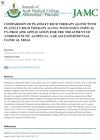 2 citations,
September 2021 in “Journal of Pharmacopuncture”
2 citations,
September 2021 in “Journal of Pharmacopuncture” Korean medicine may help with hair growth in alopecia, but more research is needed to confirm this.
2 citations,
April 2021 in “Asian pacific Journal of Tropical Biomedicine” Origanum vulgare leaf extract reduces liver and kidney damage caused by finasteride in mice.
 1 citations,
October 2023 in “Indian dermatology online journal”
1 citations,
October 2023 in “Indian dermatology online journal” Many people use home remedies for skin conditions, but there's limited scientific evidence to support their effectiveness.
 1 citations,
May 2023 in “Frontiers in Endocrinology”
1 citations,
May 2023 in “Frontiers in Endocrinology” Autism's genetics are linked with early age of puberty and less hair loss, but not with hormone levels or polycystic ovary syndrome.
 1 citations,
March 2023 in “Phytochemistry Reviews”
1 citations,
March 2023 in “Phytochemistry Reviews” CBD may improve skin and hair health, but its effective use and safety need more research.
 1 citations,
May 2022 in “IntechOpen eBooks”
1 citations,
May 2022 in “IntechOpen eBooks” Obesity leads to physical, metabolic, reproductive issues, higher healthcare costs, and mental health problems.
1 citations,
January 2022 in “Springer eBooks” 1 citations,
July 2020 in “Reviews in separation sciences”  1 citations,
February 2017 in “Journal of pharmacology & clinical research”
1 citations,
February 2017 in “Journal of pharmacology & clinical research” The herbal hair gel with Eclipta alba and Lippia nodiflora extracts was more effective at growing hair than the control gel and minoxidil.
 1 citations,
January 2017 in “Current Dermatology Reports”
1 citations,
January 2017 in “Current Dermatology Reports” Early baldness in men may indicate risks for obesity, metabolic syndrome, insulin resistance, and heart disease, similar to women with PCOS. Alopecia areata is often linked with autoimmune diseases and mental health issues. Certain hair disorders are due to genetic issues, and chemotherapy can cause hair loss through specific biological pathways. Iron deficiency's link to hair loss is still disputed.
1 citations,
November 2011 in “British journal of pharmacology” Enzymes are classified into six types and are essential for many biological processes, with only a few targeted by drugs.
 December 2024 in “PLoS ONE”
December 2024 in “PLoS ONE” Hair growth serums A and C can affect hair growth genes and pathways, suggesting potential for personalized hair loss treatments.
 December 2024 in “Revista Eletrônica Perspectivas da Ciência e Tecnologia - ISSN 1984-5693”
December 2024 in “Revista Eletrônica Perspectivas da Ciência e Tecnologia - ISSN 1984-5693” Polymeric nanoparticles could improve hair loss treatments by delivering drugs more effectively to hair follicles.
 December 2024 in “Advanced Composites and Hybrid Materials”
December 2024 in “Advanced Composites and Hybrid Materials” Electrospun 3D nanofibrous materials show promise for bone regeneration in orthopaedics.
 December 2024 in “Archives of Dermatological Research”
December 2024 in “Archives of Dermatological Research” COVID-19 vaccines do not increase the risk of alopecia areata.
December 2024 in “IntechOpen eBooks” Drug repurposing speeds up development, cuts costs, and uses known safe drugs, but faces challenges like regulations and patents.
 July 2024 in “Medical alphabet”
July 2024 in “Medical alphabet” Premature graying and hair changes can be treated with certain peptides and possibly targeting the endocannabinoid system.
 June 2024 in “Journal of Ayub Medical College Abbottabad”
June 2024 in “Journal of Ayub Medical College Abbottabad” Combining PRP with Procapil is more effective for hair loss treatment than PRP alone.
May 2024 in “Pharmacia/Farmaciâ” Purple sweet potato leaf extracts can help treat hair loss and fungal infections.
 May 2024 in “Scientific African”
May 2024 in “Scientific African” Three natural compounds from Ghanaian plants may help treat BPH and alopecia.
 May 2024 in “Aesthetic plastic surgery”
May 2024 in “Aesthetic plastic surgery” Combining PRP with minoxidil significantly improves hair growth in AGA patients.
May 2024 in “Frontiers in Nutrition” Turning food waste into useful products is key for a sustainable economy.
 May 2024 in “Journal of medicinal food”
May 2024 in “Journal of medicinal food” Jojoba oil has many uses beyond skincare, including health benefits and pharmaceutical applications.
 April 2024 in “Human genomics”
April 2024 in “Human genomics” Identified genes linked to male-pattern baldness may help develop new treatments.
 January 2024 in “Authorea (Authorea)”
January 2024 in “Authorea (Authorea)” Nanomaterials can significantly improve wound healing and future treatments may include smart, real-time monitoring.
 November 2023 in “Advanced functional materials”
November 2023 in “Advanced functional materials” Magnesium Silicate Sprays help heal burn wounds and regrow skin features better than commercial products.
 October 2023 in “IntechOpen eBooks”
October 2023 in “IntechOpen eBooks” Genes and epigenetic changes are important in the development of Polycystic Ovary Syndrome.
 August 2023 in “Clinical, Cosmetic and Investigational Dermatology”
August 2023 in “Clinical, Cosmetic and Investigational Dermatology” Research on the human skin microbiome has grown, focusing on skin health and diseases, with more studies needed on antibiotic resistance and AI applications.
 June 2023 in “BMC Pharmacology and Toxicology”
June 2023 in “BMC Pharmacology and Toxicology” The trial will test if proxalutamide is safe and effective in reducing death in severe COVID-19 patients.
May 2023 in “Karnataka Pediatric Journal” Early diagnosis and aggressive treatment are crucial for managing SLE-related pancreatitis in children.






















